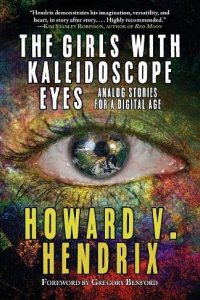Gabino Iglesias Reviews The September House by Carissa Orlando
 The September House, Carissa Orlando (Berkley 978-0-59354-861-5, $27.00, 352pp, hc) September 2023. Cover by Daniel Brount.
The September House, Carissa Orlando (Berkley 978-0-59354-861-5, $27.00, 352pp, hc) September 2023. Cover by Daniel Brount.
Books that can make you feel things are special, and Carissa Orlando’s The September House will make readers feel a lot of different things. The September House is a strange horror novel in which the horror elements are mostly dealt with using the kind of nonchalance people display while waiting in line at the bank. From ghastly visions and hundreds of dead birds to screams in the night and ghosts that can physically attack you, there is a lot to process in this novel, but the main character makes all those things feel like everyday events instead of horrific things, and that makes this novel unique.
Margaret and her husband, Hal, always wanted to have a beautiful home they could call their own. For most of their lives, that was impossible, so when things finally fell into place and they acquired an old, beautiful Victorian house, they were very happy. Unfortunately, the house didn’t come without some problems. While everything was okay for a while, Margaret and Hal quickly realized their new home was haunted, and things got really bad every September. Howling ghosts, walls dripping blood, birds killing themselves by slamming against the house at top speed, dead children roaming every room, and an evil presence in the basement are only some of the horrifying things the couple must deal with. Hal wants none of it and wants to leave, to abandon the home they finally got. Margaret won’t hear a word of it. She always wanted a house like that, and now that she has it, some sleepless nights and a few scars from a ghost’s teeth aren’t going to make her leave her beloved abode. Margaret thinks everything can be survived, and she stays strong and learns to navigate everything the house throws her way every September. When it becomes too much for Hal and he leaves, Margaret knows she must pretend things are okay, but when her daughter Katherine starts looking into Hal’s absence, things get complicated. And Katherine insists on visiting…during September. Katherine’s visit means Margaret has to deal with everything the house throws at her while also pretending that everything is okay, hiding the hauntings from Katherine as much as she can, and trying to participate in the search for Hal to keep suspicion at bay.
The September House is a rare book that works beautifully and also doesn’t work. Strangely enough, the same elements are responsible for both things. The novel works because the horror is visceral and always present. The house is not only a character; it is a character that’s full of characters. Readers get to learn the story of the family that died mysteriously at the house and they get to see Margaret discover, learn about, and then cope with each of the many ghosts that live in the house. Also, while the presence of flies, dead birds, and blood on the walls are all horror clichés, Orlando makes these elements fit well into her narrative, and they never feel lazy or like something used just to make the story horrific.
While everything in the preceding paragraph makes this novel sound like a superb, gripping narrative – and don’t get me wrong, many parts of it are just that – for me, the characters push against everything that works in the novel. Hal is mostly absent, so he’s never that important except for providing the reason for Katherine to come home. However, Margaret, who narrates the story, and Katherine, the disruptive force who precipitates many things, are both somewhat easy to ignore. This isn’t to say they are dislikeable – dislikeable characters can still be memorable and have the ability to carry a narrative and make it engaging. In this case, however, for me, they are more or less forgettable. Katherine is angry, and we learn about why she is the way she is and about how her love life has crumbled, but I didn’t care enough to be emotionally invested in her. As a secondary character, that’s not too important. When it comes to Margaret, however, things are different. Margaret lives by these words: ‘‘Everything is survivable.’’ At the beginning, this makes her come across as a sort of strange hero who sticks to her guns and stays in the house despite everything because the house is her dream come true. We can see that and empathize. Then the rest of the story hits, and we see how much she suffers while pretending not to care too much. And then come the rest of the revelations, which reveal Margaret as the kind of individual who has very little self-worth and who allows things to happen while they sort of hover above them and watch it all go down. Ultimately, I think Margaret doesn’t care much for herself, and it’s incredibly hard for me to care for a main character who doesn’t care about themselves.
Orlando is a talented storyteller, and the decisions made in this novel were brave, which makes me very curious about whatever she publishes next.
Gabino Iglesias is a writer, journalist, professor, and book reviewer living in Austin TX. He is the author of Zero Saints and Coyote Songs and the editor of Both Sides. His work has been nominated to the Bram Stoker and Locus Awards and won the Wonderland Book Award for Best Novel in 2019. His short stories have appeared in a plethora of anthologies and his non-fiction has appeared in the New York Times, the Los Angeles Times, and CrimeReads. His work has been published in five languages, optioned for film, and praised by authors as diverse as Roxane Gay, David Joy, Jerry Stahl, and Meg Gardiner. His reviews appear regularly in places like NPR, Publishers Weekly, the San Francisco Chronicle, Criminal Element, Mystery Tribune, Vol. 1 Brooklyn, the Los Angeles Review of Books, and other print and online venues. He’s been a juror for the Shirley Jackson Awards twice and has judged the PANK Big Book Contest, the Splatterpunk Awards, and the Newfound Prose Prize. He teaches creative writing at Southern New Hampshire University’s online MFA program. You can find him on Twitter at @Gabino_Iglesias.
This review and more like it in the December and January 2023 issue of Locus.
 While you are here, please take a moment to support Locus with a one-time or recurring donation. We rely on reader donations to keep the magazine and site going, and would like to keep the site paywall free, but WE NEED YOUR FINANCIAL SUPPORT to continue quality coverage of the science fiction and fantasy field.
While you are here, please take a moment to support Locus with a one-time or recurring donation. We rely on reader donations to keep the magazine and site going, and would like to keep the site paywall free, but WE NEED YOUR FINANCIAL SUPPORT to continue quality coverage of the science fiction and fantasy field.
©Locus Magazine. Copyrighted material may not be republished without permission of LSFF.







